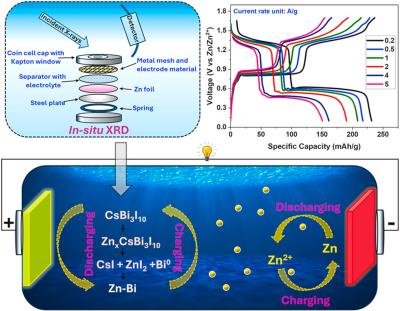Zinc-ion batteries (ZIBs) are emerging as a candidate for use as an efficient and sustainable energy storage solution, offering advantages in terms of cost-effectiveness, safety, and performance. The key to commercializing ZIBs lies in developing cathode materials that offer high specific capacity and prolonged cycle performance.
In a recent study, researchers from the Indian Institute of Science and University of Melbourne have demonstrated the capability of environmentally friendly, lead-free inorganic perovskites for high-rate rechargeable aqueous zinc-ion batteries with enhanced stability and excellent rate performance.
The battery reportedly exhibited a high specific capacity of 220 mAh/g at a current density of 1000 mA/g, a quite stable capacity of 50 mAh/g and a good cycling stability of 20000 cycles at a very high rate of 20 A/g.
The caesium bismuth iodide perovskite emerges as a promising candidate for cathode material in Zn-ion batteries, exhibiting high specific capacity and superior rate cyclability.
Furthermore, incorporation of Ag in CsBi3I10 is found to enhance the specific capacity and exhibits superior cycling stability.
This study marks an advancement in the utilization of perovskite materials as new cathodes for high-rate ZIBs.




